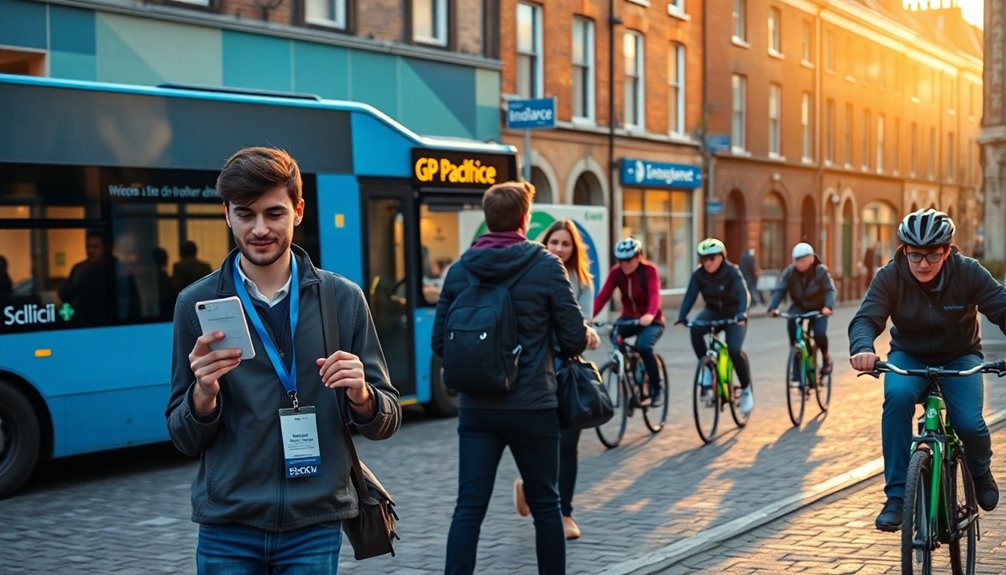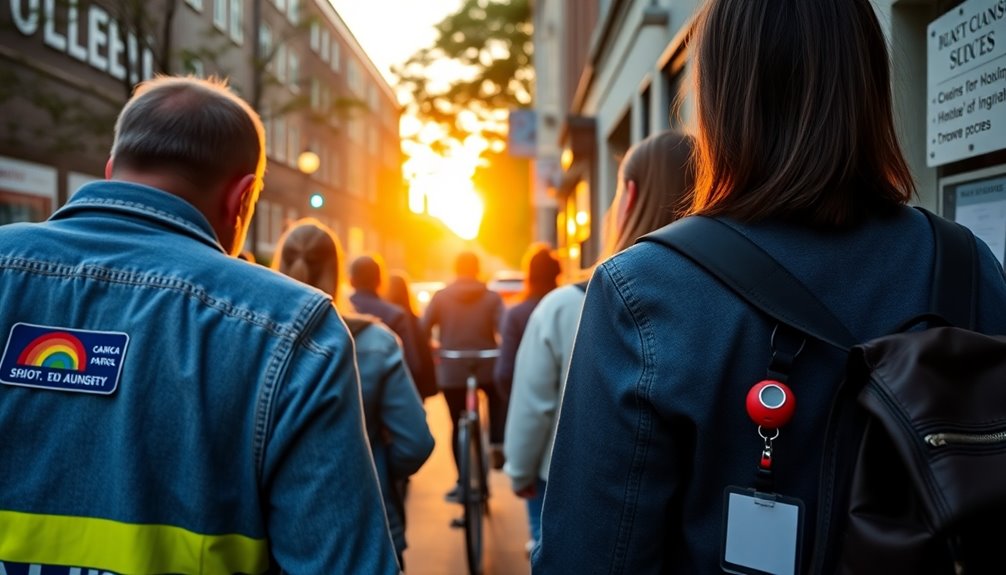
You’ll find Dublin warm and walkable, with friendly locals who make practicing English part of daily life. Courses and language clubs suit every level, while cosy cafés, libraries and university halls give great study spots. Use a LEAP Card for cheap travel, set a realistic budget, and pick accommodation that balances cost and community. Register with a GP, get a SIM and bank account, and enjoy free museums and weekend trips — keep going and you’ll learn practical tips and tools next.
Why Dublin Appeals to International English Learners
Why choose Dublin for learning English? You’ll find a city that lets you roam freely while improving your skills. Dublin’s friendly locals invite conversation, so cultural immersion happens naturally in cafés, markets, and parks. You’ll get authentic language practice every day — in classrooms, at gigs, and during casual chats at pubs — without feeling confined to textbooks. The compact city makes exploring easy, so you can balance study with spontaneous adventures along the river, galleries, and coastal walks. You’ll appreciate flexible course options and social events that match your pace and desire for independence. If you want to learn while living fully, Dublin offers practical chances to grow your fluency and confidence.
Finding Student Accommodation in Dublin
When you’re looking for housing in Dublin, you’ll want to compare university halls with private rentals to see which fits your budget and lifestyle. University accommodation can offer convenience and a built‑in community, while private lets give more independence and variety. We’ll cover how to find halls, spotting reliable private listings, and what to watch for in contracts and bills.
University Halls Options
One clear starting point is university-run halls, which give you guaranteed contracts, easy access to campus facilities, and straightforward support from student services. You’ll find halls amenities like study rooms, gyms, and laundry that simplify daily life so you can focus on classes and exploring Dublin. Communal living means shared kitchens or lounges where you’ll meet people from everywhere, practice English, and form quick friendships without committing to long leases. You’ll have quieter options if you need study space and social flats if you crave company. Contracts are usually for the academic year, with clear rules and support staff to help with problems. Choosing halls lets you keep independence while having a safety net during your first term.
Private Rental Tips
If you’re ready to look beyond university halls, renting privately can give you more choice over location, budget, and lifestyle—but it also means you’ll need to do more homework. You’ll want clear lease agreements and to understand tenant rights before signing; check clauses on notice periods and repairs. Budgeting tips matter: factor in rental deposits, utilities, and council tax equivalents so you’re not surprised. For roommate considerations, agree rules on bills, guests, and cleaning ahead of time. When finding locations, balance commute, safety, and nightlife to match your freedom. Inspect apartment amenities—laundry, heating, storage—and compare offers in the current rental market. Trust your instincts, ask questions, and keep records of everything.
Navigating Public Transport and Getting a Leap Card
Getting around Dublin’s public transport is straightforward once you understand the network and grab a LEAP Card; trams (Luas), buses, and trains (DART/Commuter) all accept it, giving you cheaper fares and seamless transfers across services. You’ll love the freedom to hop on Dublin buses or a Luas, tap your LEAP Card at stops, and explore without cash. Load it online or at shops, get student discounts, and register it so you won’t lose balance if it’s stolen.
| Service | Tip |
|---|---|
| Luas | Tap when boarding and exiting |
| Dublin buses | Tap on the reader when boarding |
| DART | Use for coastal trips |
| Commuter trains | Check schedules in advance |
| Top-up | Online, app, or shop |
Carry your LEAP, plan routes, and enjoy flexible, independent travel.
Cost of Living for Students: Budget Tips
Because rent and daily expenses can add up quickly, it’s smart to set a realistic monthly budget before you arrive in Dublin. Decide your essentials — rent, utilities, food, transport — then leave room for social life and small adventures. Save by learning cheap grocery shopping habits: buy seasonal produce, use markets, and shop store brands. Cook at home more often; batch meals freeze well. Track spending with simple budgeting apps so you spot leaks and adjust fast. Share accommodation and bills to cut costs, and pick a phone plan that matches your usage. Keep a flexible buffer for unexpected fun or emergencies. With clear priorities and tools, you’ll keep freedom without financial stress.
Choosing the Right English Course and School

How do you pick the right English course and school in Dublin without wasting time or money? You’ll want clear course accreditation and honest student feedback to gain freedom in learning. Check teaching methods—do they match how you learn?—and weigh school reputation against cost and vibe. Trustable reviews and trial classes help you decide quickly.
| What moves you | What grounds you |
|---|---|
| Energetic, communicative classes | Accredited programs, clear outcomes |
| Peer stories of growth | School reputation and solid feedback |
Choose a school that lets you move fast, speak freely, and follow practical teaching methods. That combination keeps your time and money focused on progress, not paperwork.
Part-Time Work and Visa Considerations for Students
Once you’ve picked a course that fits your learning style and budget, you’ll want to understand how working while you study affects your finances and visa status in Ireland. You can seek flexible work opportunities that let you explore the city and keep control of your time, but you must balance hours with study. Know visa regulations to avoid penalties: check permitted weekly hours, allowed job types, and any seasonal changes. Learn your student rights so employers can’t exploit you, and be clear on employment restrictions tied to your visa category.
- Find part-time roles near campus or remote gigs
- Verify hourly limits and seasonal exceptions
- Keep records of contracts and payslips
- Use campus advisers for visa questions
- Prioritize study when schedules clash
Libraries, Study Spaces, and Quiet Cafés
You’ll find plenty of quiet library corners where you can focus between lectures. If you prefer a more relaxed vibe, cozy study cafés offer reliable Wi‑Fi and friendly noise levels for working or meeting classmates. Try both to see which fits your routine and deadlines best.
Quiet Library Corners
While Dublin hums with cafés and student events, you’ll find pockets of calm in its libraries, tucked-away study rooms, and quiet cafés where you can concentrate without distractions; these spaces mix reliable Wi‑Fi, power outlets, and comfortable seating so you can work for hours. You’ll learn study techniques that fit your pace, and you’ll respect library etiquette to keep the calm. Choose a corner, set boundaries, and enjoy freedom to focus.
- A sunlit bay window with a small table and view of the Quad
- A soundproofed group room you can book for focused sessions
- Stacks-lined aisles where whispering is the norm
- A quiet mezzanine for long writing stretches
- A secluded table near outlets for uninterrupted laptop work
Cozy Study Cafés
From the hush of library corners you can slip into Dublin’s cozy study cafés, where the hum of espresso machines and low conversation creates a productive background buzz. You’ll find a cozy ambiance that lets you focus without feeling confined; windows, warm lighting, and a playlist that won’t steal your thoughts. Bring your study essentials—laptop, charger, notes—and claim a corner table or bar seat. These cafés balance solitude and community, so you can work freely, pause for conversation, or scribble ideas. Below’s a quick guide to pick a spot that fits your mood and needs.
| Café | Atmosphere | Best for |
|---|---|---|
| A | Quiet & warm | Deep work |
| B | Bright & social | Group tasks |
| C | Minimal | Quick reviews |
| D | Vintage | Creative study |
Social Life: Clubs, Societies, and Language Exchange Events
If you want to make friends, build skills, or just break up lecture monotony, Dublin’s clubs and societies are the quickest route in. You’ll find language clubs and cultural societies everywhere, where you can practice English, swap languages, or immerse yourself in music, film, and politics without any stiff formality. Events are low-pressure, often student-run, and perfect for exploring freedoms you crave — choose your pace, jump into debates, or organize a meet-up. Conversation nights and themed socials help you connect fast.
- Casual language exchange meetups in cafés
- University cultural societies hosting film nights
- Outdoor walking groups and weekend trips
- Creative workshops: writing, music, theater
- Volunteer and activism clubs for practical impact
Healthcare, Insurance, and Emergency Services for Students

Because staying healthy makes everything else possible, you’ll want to know how Dublin’s healthcare, student insurance, and emergency services work before you need them. You can register with a local GP for routine care, use university health centers for counselling and minor ailments, or visit walk-in clinics for quick treatment. Make sure you understand your student insurance—what’s covered for prescriptions, dental work, and overseas travel—and keep copies of policy details. For urgent situations, call 999 or 112; for non-life-threatening issues, contact your GP or NHS 24–hour services. Save emergency contacts in your phone and on paper, and know your student ID and PPS number for registrations. Knowing these healthcare options and contacts gives you freedom to explore Dublin with confidence.
Exploring Dublin on Weekends: Cultural and Free Activities
When you’ve got a weekend free in Dublin, you can pack your days with museums, markets, and riverside strolls without spending much—many top museums have free admission, Trinity College’s Long Room is a must-see (sometimes ticketed for peak times), and the National Gallery and Archaeology Museum offer world-class collections at no cost. You’ll find cultural festivals year-round, leafy parks, and vibrant street art that make wandering joyful. Slip into a market for fresh food, join a free walking tour, or relax by the Liffey and watch the city breathe. Choose what feels freeing and low-cost; Dublin rewards curiosity.
- Browse Temple Bar Market for crafts and food
- Explore free museums in Smithfield and Collins Barracks
- Catch a neighborhood cultural festivals event
- Stroll St. Stephen’s Green at sunset
- Join a free guided walking tour
Banking, SIM Cards, and Essential Student Services
Although sorting banking, a SIM card, and student services might feel bureaucratic at first, getting them set up early makes life in Dublin much easier. You’ll want to compare banking options—online banks, traditional branches, and student accounts—to find low fees and easy app access so you can move freely without cash stress. For staying connected, check sim card providers that offer pay-as-you-go plans or monthly data bundles; pick one with good coverage for travel around Ireland. Registering with your college for health visits, student ID, and library access grants practical perks and discounts. Set up direct debits for bills, keep digital copies of documents, and choose services that let you manage everything from your phone.
Safety, Rights, and Student Support Resources

Once your phone, bank, and student accounts are up and running, it’s just as important to know how to stay safe, understand your rights, and find support when you need it. You’ll want to map local safety resources like campus security, Garda stations, and emergency numbers, and learn basic precautions for nightlife and travel. Know your student rights around housing, visas, and discrimination so you can act confidently if issues arise. Use student unions, international offices, and peer networks to get advice fast. Freedom means being informed and prepared—these supports help you explore Dublin without unnecessary worry.
- Campus security contact, emergency numbers, and safe routes
- Student union advice on housing and complaints
- Garda station locations and reporting process
- University counseling and mental health services
- Peer groups and international student networks
Some Questions Answered
How Do I Register to Vote as an International Student in Ireland?
You can’t register as an international student for national Irish elections unless you meet residency/citizenship rules; check local voter registration procedures, confirm international eligibility for local elections, and submit required ID and proof of address to your council.
Can I Open a Student Bank Account Before Arriving in Dublin?
Yes — you can often open a student account before arriving; 70% of banks offer online pre‑opening. Check bank requirements and account types, bring ID and proof of enrolment, and you’ll keep flexibility once you land.
Are There Vegetarian/Halal Meal Plans in Student Residences?
Yes — you’ll usually find vegetarian and halal meal options in residences; you can request specific meal plans to match dietary preferences, swap dishes, or opt out for cooking freedom, ensuring choices that respect your lifestyle.
How Easy Is It to Continue Remote Studies While Living in Dublin?
It’s fairly doable, though it’s not all sunshine: you’ll face remote learning challenges and occasional internet connectivity issues, so you’ll need flexibility, backup plans, and a taste for independence to keep studies flowing freely.
Do English Schools Offer Formal Language Proficiency Certificates on Campus?
Yes — you’ll find schools offering on-campus language assessment and a clear certification process; they’ll test you, guide improvements, and issue recognised certificates so you’re free to study, work, or travel without bureaucratic hassle.
